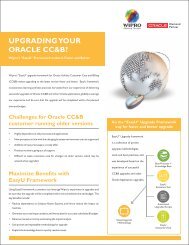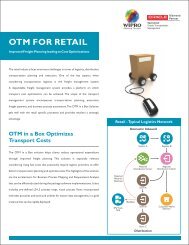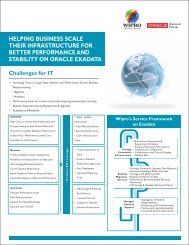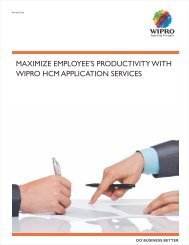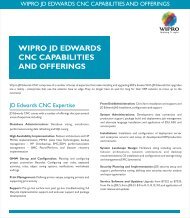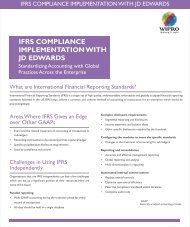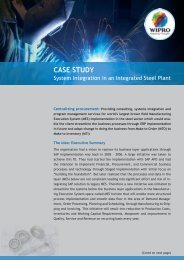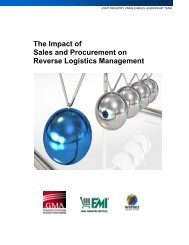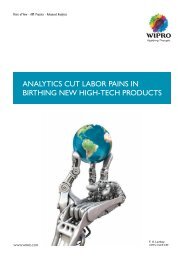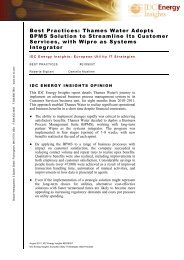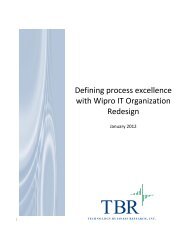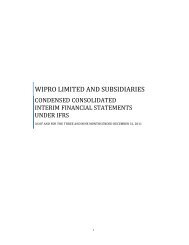Knowledge Management Strategies for Mitigating the Big Crew - Wipro
Knowledge Management Strategies for Mitigating the Big Crew - Wipro
Knowledge Management Strategies for Mitigating the Big Crew - Wipro
You also want an ePaper? Increase the reach of your titles
YUMPU automatically turns print PDFs into web optimized ePapers that Google loves.
<strong>Knowledge</strong> <strong>Management</strong> <strong>Strategies</strong> <strong>for</strong> mitigating <strong>the</strong> <strong>Big</strong> <strong>Crew</strong> Change in E&P<br />
[13] Partners and vendors are a key component of <strong>the</strong> solution since <strong>the</strong>y have expertise with equipment and <strong>the</strong>n services that<br />
may not be available in-house. A separate extranet site will be used <strong>for</strong> this group. It will have <strong>the</strong> functionality of knowledge<br />
market minus <strong>the</strong> compensation component. Partners and vendors will have an interest in ensuring that <strong>the</strong>y are adding value<br />
to <strong>the</strong>ir customer in order to secure future sales. No additional compensation model would be required.<br />
Business users would have access to <strong>the</strong> full community through portal application. They would likely first attempt to solve<br />
issues or support projects locally and <strong>the</strong>n leverage <strong>the</strong> COEs followed by partners/vendors and <strong>the</strong>n as a last resort use <strong>the</strong><br />
knowledge markets.<br />
No matter how effective <strong>the</strong> knowledge community is, <strong>the</strong>re will be gaps. Some employees will choose not to join alumni<br />
associations as consultants and <strong>the</strong>re will likely never be enough consultants to meet demand. Organizations will need to invest<br />
in operations research and expert systems to fill this need.<br />
Operations Research (OR) uses ma<strong>the</strong>matics and analytical computer-based methods to optimize scheduling to improve<br />
operations. In oil field operations veteran managers are able to use <strong>the</strong>ir experience to optimally schedule resources. Developing<br />
or producing an oil field requires a number of steps to be per<strong>for</strong>med serially or in parallel. Knowing how to budget time or<br />
estimate risks to timelines is largely a function of experience. When <strong>the</strong>se experienced employees retire, systems like <strong>the</strong>se will<br />
be required to back fill <strong>the</strong>m until <strong>the</strong> next generation of <strong>the</strong> work<strong>for</strong>ce gains experience.<br />
Below are two examples of OR systems improving operations from a recent Society of PetroleumEngineers paper titled “The<br />
Impending Expertise Crisis: New Technology Comes to <strong>the</strong> Rescue”.<br />
[14] “Saudi Aramco, <strong>the</strong> world’s largest oil producing company, realized strong improvements in key per<strong>for</strong>mance indicators after<br />
deploying Actenum’s Rig Activity Scheduler.”<br />
“The Canadian oil sands extraction company Syncrude avoided an unplanned downtime estimated at a cost of $32 million within<br />
two weeks of using a reliability driven maintenance scheduling prototype.”<br />
Expert systems use Artificial Intelligence algorithms to replace human beings. These systems use manytechnologies including<br />
rule based systems, fuzzy logic and neural networks. AI systems are most appropriate to:<br />
• Get better value from large amounts of operational data<br />
• Help experts to make better decisions by focusing on trends ra<strong>the</strong>r than details<br />
• Providing decision support that improves <strong>the</strong> effectiveness of non-experts<br />
One example is a fuzzy logic system developed by <strong>the</strong> Petroleum Recovery Research Center (PRRC), New Mexico Institute of<br />
Mining and Technology, Socorro, NM. The U.S. Department of Energy funded $523,500 of this 36 month project. Below is an<br />
excerpt from <strong>the</strong> team’s objective statement.<br />
“The objective of this project is to create a user-definable and customizable fuzzy expert system tool to dramatically speed local<br />
and regional play analysis and reduce subsequent drilling risk. This general tool will not require significant knowledge of<br />
computer<br />
programming and will guide users through <strong>the</strong> process of building a successful expert<br />
system to evaluate plays from field to basin scale using public and/or private data and <strong>the</strong>ir own knowledge.<br />
10 | www.wipro.com/industryresearch<br />
WIPRO TECHNOLOGIES




